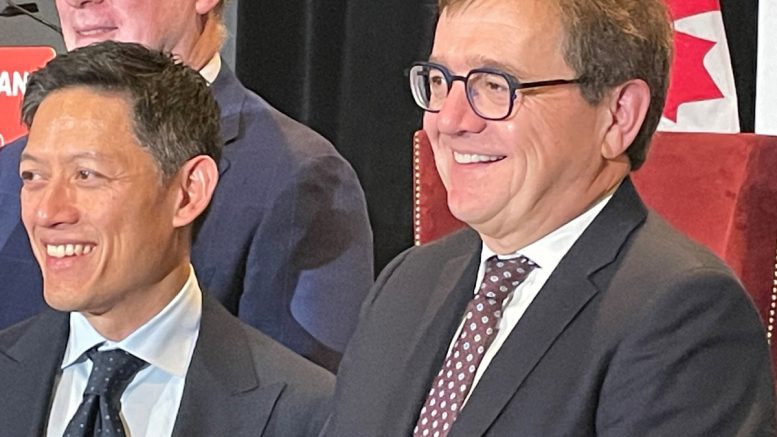Ontario has joined a country-wide consultation process to hammer out energy and mining strategies for transitioning to clean power using critical minerals, Canada’s natural resources minister said on Tuesday.
The province joins nine other provinces and territories who’ve already signed up for the ministry’s Regional Energy and Resource Tables or said they will soon join the effort, Minister Jonathan Wilkinson said. Quebec and Alberta have been delayed by leadership changes but should agree, leaving out one prairie province for now.

Reopening the Esker exploration camp in the Ring of Fire. Standing (left to right): Casimir Meshake and Bill Johnson of Aroland First Nation, and Tyrese Whitehead of Webequie. Kneeling (left to right): Tristan Megan of Marten Falls), Merle Jacob of Webequie, and Clyde Moonias of Neskantaga First Nation. Credit: Wyloo Metals
“Saskatchewan is still deciding whether it wants to participate in the process and my hope is that I will convince them to do so,” Wilkinson told The Northern Miner on the sidelines of a Canadian Club luncheon in Toronto. “It’s just an issue of capacity for them. They’re very busy with a lot of other issues.”
The tables are a platform for discussion among companies, unions, local and Indigenous communities, government levels and civil society groups. The federal ministry wants to leverage Canada’s abundant resources of some 31 critical minerals needed for technology, electric vehicle batteries and clean energy grids as nations target net-zero carbon emissions.
The natural resources ministry plans to update its $3.8-billion critical minerals strategy by year’s end with categories for funding, Wilkinson said in an interview. The fine tuning will help future talks in the tables initiative with Ontario about its Ring of Fire zone of critical minerals, he said.
“There will be money for infrastructure, money potentially for investment in projects themselves, for additional geological work,” he said. “There will be a number of different pockets of money and we will draw out of those what is required for specific projects.”
Aligning priorities and resources
The tables will aim to establish joint goals aligning federal and provincial priorities and resources, the minister told the luncheon. The talks will identify the most significant three to five economic areas of opportunity in each province or territory needed for a transition to a low-carbon future.
Wilkinson also touched on the need for more nuclear energy, debunked fears of job losses, and championed carbon pricing. In addition, he promised a response from Canada to recent energy and mining industry support by the United States and said domestic mining projects needed quicker approvals.
“It is clearly the case in this country that we need to find pathways to develop projects more rapidly than we have in the past,” the minister said. “If it really takes us 12 years to develop a new lithium, graphite or copper mine, we will not have sufficient quantities of the minerals we need to actually build the cars that are required to get rid of the emissions.”
One way is to conduct federal and provincial approval processes at the same time instead of consecutively, and the consultation tables could help sort them out, he said.
The U.S. has recently approved industry support in areas such as hydrogen energy and electric battery metals processing and manufacturing, presenting challenges that Canada must address, Wilkinson said.

Phase 1 of Nouveau Monde Graphite’s purification plant in Bécancour, Que. Nouveau Monde Graphite photo
‘The Americans need our critical minerals’
“I can’t tell you when we’re going to respond, but at the end of the day we will need to respond,” the minister said. “Canada has more levers in this world, too. The Americans needs our critical minerals.”
Selling the concept of nuclear energy outside the provinces that use it, such as Ontario and New Brunswick, will be difficult, he said. There are fears over the disposal of nuclear waste. But the enormous pace and scale required for transitioning away from fossil fuels demands more nuclear power, he said.
“There are parts of this country with zero experience with nuclear power and for them it’s a bit scary,” the minister said. “If you went to British Columbia and asked them about nuclear power, I don’t think you’d get the same answer as you would from Ontario.”
Wilkinson said he found it puzzling that the opposition Conservatives reject a market-driven solution for pollution. Carbon pricing simultaneously reduces emissions and gives most Canadians back more in rebates than they pay, he said.
“A market mechanism that Conservatives would normally have said ‘that’s the way to do it’ is something that is rejected in favour of massive government intervention, it just belies logic,” he said. “I find the discussion frustrating.”


Be the first to comment on "As Ontario joins clean energy talks, federal minister Wilkinson looks to streamline project approvals "